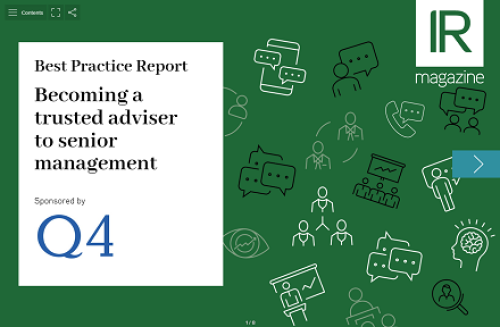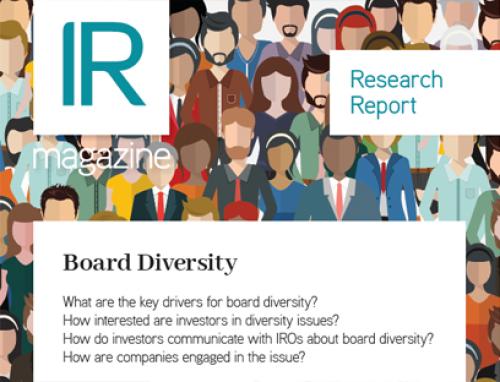Report from IR magazine’s recent think tank in London
European countries – especially Spain, Portugal and Greece – have all been affected by the burgeoning debt crisis, a crisis that provided plenty of talking points at IR magazine’s think tank for European corporates.
This year’s IR Magazine Euro Leaders Think Tank was attended by around 50 IROs hailing from 19 different countries. Many of the assembled had similar gripes to share, from dealing with unruly sell-siders to difficult CEOs. Like last year, this event was held in London, with the morning split into three sessions, each lasting one hour.
Improving shareholder engagement
The first session came as a slew of Green Papers were set to be issued from Brussels, including some chunky European governance reviews. Recent papers include the EU Green Paper ‘Corporate governance in financial institutions’, which is seeking responses until early September. The paper includes suggestions on how to improve the regulation of credit rating agencies.
With around 70 percent of shares held outside domestic markets, shareholder engagement has become increasingly challenging, agreed the panel. One governance expert said voting is only the first step in engagement, pointing out the important distinction between asset managers and asset owners. He also flagged up antipathy in the UK toward the Financial Reporting Council’s decision to implement the annual election of directors and chairs.
Another concern was the bombardment of sustainability questionnaires: should companies worry about being blacklisted? Who are the SRI opinion makers? Many agreed they were increasingly on the receiving end of weak questionnaires on sustainability and did not know how to deal with all the information requests.
Assessing the success of your IR
The Holy Grail of investor relations, performance metrics are always top of mind for IROs. Tying performance-based compensation to IR metrics is no easy task for many management teams, however. Most agreed that performance should not be based solely on hard numbers. Some IROs use a scorecard that includes several values plus direct feedback from investors. Common metrics include how many meetings are conducted with top investors.
‘The main objective, particularly for complex industries, is always to go back to basics and attempt to instill an understanding of how the firm makes its money and which countries matter are important,’ said one attendee.
Other objectives include aiming for reduced dilution, looking at peer ownership and winning IR awards. ‘One of the things that disappoints me the most is when a lot of IR teams pat themselves on the back after a 5 percent-10 percent rise in share price on results day,’ commented one sell-side analyst on the panel. ‘Stock price movement shouldn’t happen on results day – it means IR is not doing its job.’
Most agreed that stock options are bad for IR and can be a distraction. ‘My bonus is linked to my performance when management members come on the road with me – they can see how investors relate to me and us as a company,’ said another panelist. Several IROs also said perception studies are a costly (if necessary) way to garner feedback but that they shouldn’t be the sole method.
Ultimately, most of the attendees agreed the key role of the IR person is to ensure that CFOs and CEOs never meet a new analyst who has no knowledge of the company.
The changing nature of the buy side
Are investors are being more conservative? What will be the role of credit ratings agencies in the future? IROs always relish the chance to ask questions of the buy side.
Issuers and investors seem to be growing increasingly tired of quarterly reporting. A common conception is that the buy side using the sell side less and less. One investor felt the sell side was becoming less relevant as investors moved to longer-term positions and away from quarterly earnings and earnings forecasts. ‘More and more it’s about coming direct to the IRO for more information,’ he said. ‘Analysts only really care about profit and the income statement.’
Meanwhile, smaller boutique research houses are springing up and producing more research. Some issuers reported that increasing numbers of analysts are producing research of a dubious quality. The analysts in question don’t engage with the companies they are covering and companies accuse them of producing misleading research and phony forecasting. So how should issuers deal with them? Disengaging isn’t really an option, agreed the audience. One IRO shared his strategy for dealing with so-called rogue analysts who lacked important knowledge about his sector. ‘I tell them I will answer their questions if they answer one of mine,’ he recounted. ‘I then ask them a fundamental question about the sector and see how they react. They rarely know the answer.’
How can you get analysts on board? Some advocate offering to make an analyst an expert. ‘Take them to see the divisional heads,’ he suggested. ‘Use them as a channel. They aren’t going to get a meeting with the CEO but it can be useful to get them onside.’
IR Magazine Leaders
Beginning with the formation of our first group in the UK and continental Europe, we’ve identified the most respected IR professionals in each region and gathered them together for think-tank events and networking sessions to foster development of the global community.
IR Magazine Leaders are those practitioners who have achieved more than 75 points in this year’s investor perception study for their region or country. These studies are conducted by independent research firms and inform the IR magazine global awards program, the definitive measure of global IR excellence.










